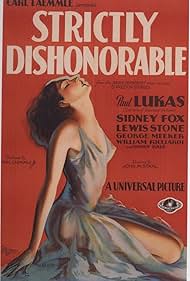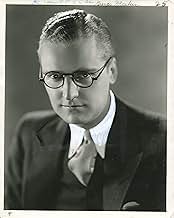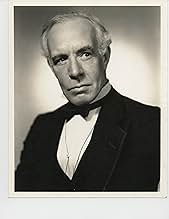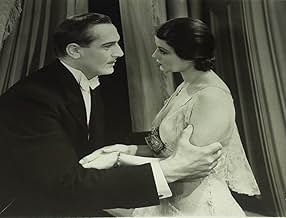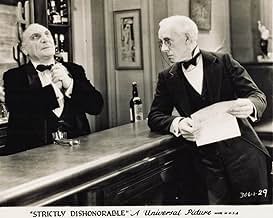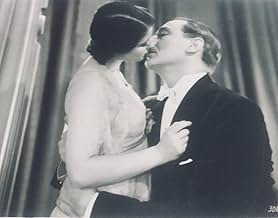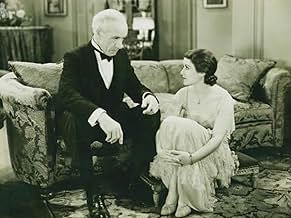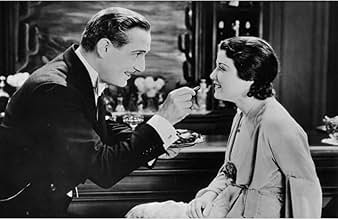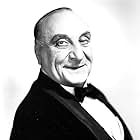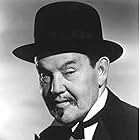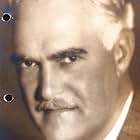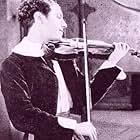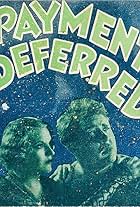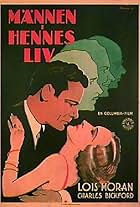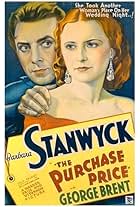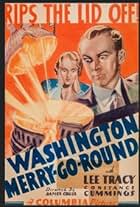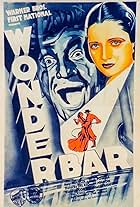Ajouter une intrigue dans votre langueA womanizing singer falls for an old-fashioned Southern belle. The problem is, she already has a fiance.A womanizing singer falls for an old-fashioned Southern belle. The problem is, she already has a fiance.A womanizing singer falls for an old-fashioned Southern belle. The problem is, she already has a fiance.
- Réalisation
- Scénario
- Casting principal
- Récompenses
- 3 victoires au total
Samuel Bonello
- Waiter
- (non crédité)
Aldo Franchetti
- Arguing Customer
- (non crédité)
Joseph W. Girard
- Officer
- (non crédité)
Carlo Schipa
- Waiter
- (non crédité)
Joe Torillo
- Cook
- (non crédité)
Avis à la une
There is no need to go on and on about this film. The plot is pretty simple and I don't even want to spoil that. Trust me in saying the film is funny, has great characters, and both Fox and Lukas work well together.
I do not know Sidney Fox's career but after seeing this, I look forward to more viewings of her. She has a Southern accent in this film, and I am not sure if it is for the part, or that was just her. Unfortunately she only had a career from 1931 to 1935. She deserved more recognition.
The story moves smoothly. You will recognize Lewis Stone, who later was known as "Judge Hardy". He plays a judge in this film too.
I found myself laughing out loud at certain situations and lines. Lewis Stone is called a "barfly" in one scene and his reaction to this characterization is hilarious. They just don't make "fun" movies like this any more.
Check it out. It is a piece of fun fluff but it is still a Classy Classic to be enjoyed.
I do not know Sidney Fox's career but after seeing this, I look forward to more viewings of her. She has a Southern accent in this film, and I am not sure if it is for the part, or that was just her. Unfortunately she only had a career from 1931 to 1935. She deserved more recognition.
The story moves smoothly. You will recognize Lewis Stone, who later was known as "Judge Hardy". He plays a judge in this film too.
I found myself laughing out loud at certain situations and lines. Lewis Stone is called a "barfly" in one scene and his reaction to this characterization is hilarious. They just don't make "fun" movies like this any more.
Check it out. It is a piece of fun fluff but it is still a Classy Classic to be enjoyed.
STRICTLY DISHONORABLE (Universal, 1931), directed by John M. Stahl, stars Paul Lukas (courtesy of Paramount Pictures), Sidney Fox and Lewis Stone (on loan from Metro-Goldwyn-Mayer), in this screen adaptation from the original stage play by Preston Sturges, years before winning fame as a comedy director for Paramount Pictures in the 1940s. With the screenplay by Gladys Lehman, which was reportedly said to have stuck close to the play and mood, this screen adaptation, virtually a filmed stage play, comes to life through much of its then risque dialogue that would never have gone passed the production code of 1934.
Plot summary: Isabelle Parry (Sidney Fox) is a Southern gal engaged to marry the bespectacled stuffy bond salesman, Henry Greene (George Meeker). While driving down the crowded New York City streets of Broadway (with movie marque of Maurice Chevalier starring in "The Smiling Lieutenant" visible) on their way home to New Jersey, the couple decide to stop at a speakeasy. Managed by Tomasso (William Riccardi), the bar also consists of a former judge, Dempsey (Lewis Stone) having a few "old fashions." While Dempsey befriends Isabelle, he gets turned off by Henry's arrogance. Also entering the scene is Gus Di Ruva (Paul Lukas), a famed opera singer better known by his stage name of Tino Caraffa. Like the kindly judge, who lives in the apartments above, he also gets turned off by Henry's unlikable personality. As Officer Mulligan (Sidney Toler) asks the owner (Henry) whose car is parked next to a fire hydrant to have it moved, during his absence, Isabelle and Gus become better acquainted during their dancing to the record playing tune of "It Happened in Monterey," Discovering this, Henry's jealousy and rude remarks force Isabelle to call off their engagement. Wanting to have Mulligan arrest Gus and Tomasso for the abduction of Isabelle, Henry ends up jailed instead. In the meantime, with no place else to go, the free-spirited Isabelle, who has been living with Henry and his parents under the same household, is offered a place to stay - being Gus's apartment on a "strictly dishonorable" basis. While the judge feels Isabel to be immoral and that she's be better off staying at the Martha Washington Hotel instead, Gus comes to the conclusion of buying her train tickets back to where she came from, but begins to have second thoughts. Situations occur when Henry, released from jail, returns to the scene.
In general, STRICTLY DISHONORABLE is a showcase for Sidney Fox. She not only gets enough camera closeups, but is virtually in every scene. Her Southern accent comes similar to her performance in THE MOUTHPIECE (Warners, 1932), for which she once more plays a girl from the South. Lewis Stone, who interestingly was featured in a similar sounding movie title, STRICTLY UNCONVENTIONAL (MGM, 1930), is perfect as the moral-minding judge, a role no different from his Judge Hardy portrayal in the "Andy Hardy" family series (1937-1946) for his home studio of MGM. The top-billed Paul Lukas is perfectly cast as the accented-speaking opera singer whose character is hinted as one being a ladies man and no stranger of having women living in his quarters. His girlfriend, Lilli (never seen) is passed off as his cousin to Isabel.
One interesting aspect for STRICTLY DISHONORABLE is the camera tracking through windows and stairways to keep this 91 minute production from being virtually stage-bound. Maybe not as amusing as it was back in 1931, STRICTLY DISHONORABLE comes as surprising through its frankness as the Isabelle character showing no shame in saying she lives with her fiance. This dark-haired beauty with a male-sounding name, Fox proves herself worthy in what might be considered her best screen performance to her short-lived movie career. Situations move briskly throughout the story, especially how one could fall in love and want to marry a total stranger the very same evening of their first encounter. George Meeker is strictly obnoxious in character while William Riccardi (reprising his stage role) is strictly available throughout for comedy relief gestures involving both judge and opera singer friends.
Unavailable for viewing due to the 1951 MGM remake starring Enzio Pinza and Janet Leigh, which has been softer in tone, this 1931 original, which has never been distributed to either video cassette and DVD, has been rediscovered to a new generation of movie lovers in 1997 on cable television's Turner Classic Movies. Though broadcasts for the original STRICTLY DISHONORABLE have been limited, the film in general is strictly worth viewing mainly out of curiosity. (***)
Plot summary: Isabelle Parry (Sidney Fox) is a Southern gal engaged to marry the bespectacled stuffy bond salesman, Henry Greene (George Meeker). While driving down the crowded New York City streets of Broadway (with movie marque of Maurice Chevalier starring in "The Smiling Lieutenant" visible) on their way home to New Jersey, the couple decide to stop at a speakeasy. Managed by Tomasso (William Riccardi), the bar also consists of a former judge, Dempsey (Lewis Stone) having a few "old fashions." While Dempsey befriends Isabelle, he gets turned off by Henry's arrogance. Also entering the scene is Gus Di Ruva (Paul Lukas), a famed opera singer better known by his stage name of Tino Caraffa. Like the kindly judge, who lives in the apartments above, he also gets turned off by Henry's unlikable personality. As Officer Mulligan (Sidney Toler) asks the owner (Henry) whose car is parked next to a fire hydrant to have it moved, during his absence, Isabelle and Gus become better acquainted during their dancing to the record playing tune of "It Happened in Monterey," Discovering this, Henry's jealousy and rude remarks force Isabelle to call off their engagement. Wanting to have Mulligan arrest Gus and Tomasso for the abduction of Isabelle, Henry ends up jailed instead. In the meantime, with no place else to go, the free-spirited Isabelle, who has been living with Henry and his parents under the same household, is offered a place to stay - being Gus's apartment on a "strictly dishonorable" basis. While the judge feels Isabel to be immoral and that she's be better off staying at the Martha Washington Hotel instead, Gus comes to the conclusion of buying her train tickets back to where she came from, but begins to have second thoughts. Situations occur when Henry, released from jail, returns to the scene.
In general, STRICTLY DISHONORABLE is a showcase for Sidney Fox. She not only gets enough camera closeups, but is virtually in every scene. Her Southern accent comes similar to her performance in THE MOUTHPIECE (Warners, 1932), for which she once more plays a girl from the South. Lewis Stone, who interestingly was featured in a similar sounding movie title, STRICTLY UNCONVENTIONAL (MGM, 1930), is perfect as the moral-minding judge, a role no different from his Judge Hardy portrayal in the "Andy Hardy" family series (1937-1946) for his home studio of MGM. The top-billed Paul Lukas is perfectly cast as the accented-speaking opera singer whose character is hinted as one being a ladies man and no stranger of having women living in his quarters. His girlfriend, Lilli (never seen) is passed off as his cousin to Isabel.
One interesting aspect for STRICTLY DISHONORABLE is the camera tracking through windows and stairways to keep this 91 minute production from being virtually stage-bound. Maybe not as amusing as it was back in 1931, STRICTLY DISHONORABLE comes as surprising through its frankness as the Isabelle character showing no shame in saying she lives with her fiance. This dark-haired beauty with a male-sounding name, Fox proves herself worthy in what might be considered her best screen performance to her short-lived movie career. Situations move briskly throughout the story, especially how one could fall in love and want to marry a total stranger the very same evening of their first encounter. George Meeker is strictly obnoxious in character while William Riccardi (reprising his stage role) is strictly available throughout for comedy relief gestures involving both judge and opera singer friends.
Unavailable for viewing due to the 1951 MGM remake starring Enzio Pinza and Janet Leigh, which has been softer in tone, this 1931 original, which has never been distributed to either video cassette and DVD, has been rediscovered to a new generation of movie lovers in 1997 on cable television's Turner Classic Movies. Though broadcasts for the original STRICTLY DISHONORABLE have been limited, the film in general is strictly worth viewing mainly out of curiosity. (***)
This film is a fairly faithful adaptation of a Sturges play and, unfortunately, it's stage origins show a little too plainly. One can even fairly easily tell where the Act divisions would have been.
The rhythms and confined locations betray its source-while there are witty passages, other parts do not have a snappy enough pace too advance the fairly sparse (and predictable) plot. Charming performances and has its moments, but Sturges was part of other substantially better scripts in the 30s, that have aged much better. It seems likely that the, for its time, racier elements of the plot held the attention more in its day.
Did like the jokes at the expense of West Orange, New Jersey though!
The rhythms and confined locations betray its source-while there are witty passages, other parts do not have a snappy enough pace too advance the fairly sparse (and predictable) plot. Charming performances and has its moments, but Sturges was part of other substantially better scripts in the 30s, that have aged much better. It seems likely that the, for its time, racier elements of the plot held the attention more in its day.
Did like the jokes at the expense of West Orange, New Jersey though!
After a long period of neglect Preston Sturges is now firmly enshrined in the ranks of the great filmmakers of Hollywood's golden age, celebrated by fans as a first rate director and a screenwriter of genius. His claim to fame as a great playwright remains obscure, however: from 1929 to 1932 Sturges had five plays produced on Broadway, and while two were moderately successful two more were outright flops. Only one of these works was an unqualified success, but that play-his second, a comedy called "Strictly Dishonorable"- happened to be one of the biggest smash hits of the era. Sturges seldom did anything halfway! And because this hit coincided with the birth of the talkies, it was only natural that the major studios would vie for the playwright's services as a screenwriter, and produce an adaptation. Universal Pictures won the competition and duly produced the movie. And yet, despite the renewed attention Sturges has received in recent years, the film version of his biggest stage hit seems to be in limbo, seldom screened at revival houses and, at this writing, not available in an official video or DVD release. That's a pity, for while it lacks the dizzy, iconoclastic spirit Sturges the director would bring to his screenplays of the '40s, the movie version of Strictly Dishonorable is an interesting and unusual introduction to this uniquely gifted artist.
Directed by John M. Stahl, Strictly Dishonorable is, first and foremost, a filmed play, and that's both a plus and a minus. On the plus side, Sturges' script was used almost verbatim with only a handful of cuts and minor changes, so the movie serves as a decent archival record of the show. On the other hand, because the actors recite their dialog without the benefit of a live audience (i.e. laughter) this sort of film-making can sometimes result in a kind of mummified artifact, neither live theater nor lively cinema. In this case, fortunately, the acting and the offbeat quality of the story hold viewer interest, and although it remains stage-bound this movie is more enjoyable than many other early talkies. Happily, in 1931 the filmmakers were still unencumbered by the dread Production Code, so we get not only most of the original dialog but a provocative theme, one that would never have gotten a green light from the Breen Office a few years later.
The story revolves around a young Southern belle named Isabelle Perry (played by the ill-fated Sidney Fox). Isabelle has come to New York with her unpleasant fiancée Henry, who clearly expects to control her life in every respect once they're married and safely ensconced with his family in West Orange, New Jersey. First, however, they share an unhappy night on the town in Manhattan and wind up in an atmospheric speakeasy. Here they meet a hard-drinking retired judge (Lewis Stone) whose philosophical quips perk things along, and a famous Italian opera star (Paul Lukas) known professionally as Tino Carrafa, who modestly insists on being called "Gus." Gus is an old friend of the speakeasy's proprietor, and he keeps an apartment upstairs. He's also a notorious Casanova. When Gus shows Isabelle a little too much attention her fiancée loses his temper, makes an ugly scene, and gets thrown out. However, Isabelle stays. In fact, she spends the night in Gus' room upstairs, in a pair of borrowed pajamas. The two of them have fallen in love at first sight, but now the central question becomes: will the chaste Isabelle sleep with the guy, or not? And when Henry returns in the morning, who will she choose?
A plot that hinges on a woman choosing whether or not to retain her virginity startled Broadway audiences in 1929, and surely sparked the play's great success. This is more than just a routine sex farce, however. Sturges' gift for strong characterization and witty dialog are already present. It's surprising, even now, to hear Isabelle wonder aloud why men make such a fuss about her virginity, "as if it mattered to anybody but me." Sturges' play script was re-published in the 1980s in an anthology, and when I re-read it after seeing the film I found that only a handful of lines were deleted. One significant change, however, was that while the Judge Dempsey of the play was still professionally active, the film's Dempsey is retired; apparently, the filmmakers didn't want to suggest that any working judge spends so much time hanging out drinking in speakeasies. There's also an amusing inside joke here for movie buffs, because Lewis Stone went on to cinematic immortality as MGM's wise, eminently sober Judge Hardy!
I was fortunate enough to see this rarity at NYC's Film Forum with an appreciative crowd. Stone was decidedly the audience favorite. I confess I had mixed feelings about Sidney Fox's performance during the first couple of scenes, but gradually warmed up to her. Initially her Southern accent struck me as exaggerated, but after a while it seemed like a key component of Isabelle's strategic arsenal; that is, she comes off like the kind of Southern belle who deliberately emphasizes her accent for effect. (I've known people like that.) And by the end of the movie Fox's Isabelle felt like a deft, fully rounded characterization. I was sorry to learn afterward that the film career of this attractive actress was so brief, and sorrier still to discover that her life ended tragically. The only movies she appeared in that get any attention nowadays are the ones that also feature actors who went on to bigger things: Bette Davis, Humphrey Bogart, Bela Lugosi, etc. Sidney Fox deserves better, and so does Strictly Dishonorable. There are plenty of buffs, most especially fans of Preston Sturges, who would welcome this film's re-emergence from the studio vaults.
Directed by John M. Stahl, Strictly Dishonorable is, first and foremost, a filmed play, and that's both a plus and a minus. On the plus side, Sturges' script was used almost verbatim with only a handful of cuts and minor changes, so the movie serves as a decent archival record of the show. On the other hand, because the actors recite their dialog without the benefit of a live audience (i.e. laughter) this sort of film-making can sometimes result in a kind of mummified artifact, neither live theater nor lively cinema. In this case, fortunately, the acting and the offbeat quality of the story hold viewer interest, and although it remains stage-bound this movie is more enjoyable than many other early talkies. Happily, in 1931 the filmmakers were still unencumbered by the dread Production Code, so we get not only most of the original dialog but a provocative theme, one that would never have gotten a green light from the Breen Office a few years later.
The story revolves around a young Southern belle named Isabelle Perry (played by the ill-fated Sidney Fox). Isabelle has come to New York with her unpleasant fiancée Henry, who clearly expects to control her life in every respect once they're married and safely ensconced with his family in West Orange, New Jersey. First, however, they share an unhappy night on the town in Manhattan and wind up in an atmospheric speakeasy. Here they meet a hard-drinking retired judge (Lewis Stone) whose philosophical quips perk things along, and a famous Italian opera star (Paul Lukas) known professionally as Tino Carrafa, who modestly insists on being called "Gus." Gus is an old friend of the speakeasy's proprietor, and he keeps an apartment upstairs. He's also a notorious Casanova. When Gus shows Isabelle a little too much attention her fiancée loses his temper, makes an ugly scene, and gets thrown out. However, Isabelle stays. In fact, she spends the night in Gus' room upstairs, in a pair of borrowed pajamas. The two of them have fallen in love at first sight, but now the central question becomes: will the chaste Isabelle sleep with the guy, or not? And when Henry returns in the morning, who will she choose?
A plot that hinges on a woman choosing whether or not to retain her virginity startled Broadway audiences in 1929, and surely sparked the play's great success. This is more than just a routine sex farce, however. Sturges' gift for strong characterization and witty dialog are already present. It's surprising, even now, to hear Isabelle wonder aloud why men make such a fuss about her virginity, "as if it mattered to anybody but me." Sturges' play script was re-published in the 1980s in an anthology, and when I re-read it after seeing the film I found that only a handful of lines were deleted. One significant change, however, was that while the Judge Dempsey of the play was still professionally active, the film's Dempsey is retired; apparently, the filmmakers didn't want to suggest that any working judge spends so much time hanging out drinking in speakeasies. There's also an amusing inside joke here for movie buffs, because Lewis Stone went on to cinematic immortality as MGM's wise, eminently sober Judge Hardy!
I was fortunate enough to see this rarity at NYC's Film Forum with an appreciative crowd. Stone was decidedly the audience favorite. I confess I had mixed feelings about Sidney Fox's performance during the first couple of scenes, but gradually warmed up to her. Initially her Southern accent struck me as exaggerated, but after a while it seemed like a key component of Isabelle's strategic arsenal; that is, she comes off like the kind of Southern belle who deliberately emphasizes her accent for effect. (I've known people like that.) And by the end of the movie Fox's Isabelle felt like a deft, fully rounded characterization. I was sorry to learn afterward that the film career of this attractive actress was so brief, and sorrier still to discover that her life ended tragically. The only movies she appeared in that get any attention nowadays are the ones that also feature actors who went on to bigger things: Bette Davis, Humphrey Bogart, Bela Lugosi, etc. Sidney Fox deserves better, and so does Strictly Dishonorable. There are plenty of buffs, most especially fans of Preston Sturges, who would welcome this film's re-emergence from the studio vaults.
Early film musicals kept the Broadway viewpoint, shooting all the their musical numbers under the proscenium arch. Just a few years later they looked old fashioned. Strictly Dishonorable shows the same problem with shooting a play exactly as seen on Broadway. It dismisses almost entirely with the opportunities of the camera. Lighting is flat, camera movement minimized, and closeups almost non existent. For a wordy play, where almost nothing physical happens, this is death. Cinematographer Karl Freund must have gone home every night in tears. It is slooooooooow. The few witty lines are swallowed up by the inane.
I thought the entire cast, with the exception of the bit players, miscast. Sydney Fox, in particular, didn't have the chops for such a large and varying role. Paul Lucas didn't seem to me sleazy enough to be a rue'. Lewis Stone couldn't carry off a drunk. And Sydney Toler as an Irish cop?
I found the constant changes in attitude of the principals to unbelievable. Fox's coquettishness, like her accent, came and went.
Now, I must say, although I love pre-code films, there are some I do not burn to disk. This would have been one of them. However, my wife, who hates these films, saw it as a teenager, insisting on watching it in its entirety. I stayed for about an hour of it, before leaving out of complete boredom. I think this was sentimentality on her part, just like my watching The Phantom Empire serial several times a year, even though I know it's pretty bad.. So, at her request, I'm burning this one while holding my nose.
I thought the entire cast, with the exception of the bit players, miscast. Sydney Fox, in particular, didn't have the chops for such a large and varying role. Paul Lucas didn't seem to me sleazy enough to be a rue'. Lewis Stone couldn't carry off a drunk. And Sydney Toler as an Irish cop?
I found the constant changes in attitude of the principals to unbelievable. Fox's coquettishness, like her accent, came and went.
Now, I must say, although I love pre-code films, there are some I do not burn to disk. This would have been one of them. However, my wife, who hates these films, saw it as a teenager, insisting on watching it in its entirety. I stayed for about an hour of it, before leaving out of complete boredom. I think this was sentimentality on her part, just like my watching The Phantom Empire serial several times a year, even though I know it's pretty bad.. So, at her request, I'm burning this one while holding my nose.
Le saviez-vous
- AnecdotesThe play opened in New York City, New York, USA at the Avon Theater on 18 September 1929 and ran for 557 performances. William Ricciardi originated his role in the play, and Louis Jean Heydt was also in the cast.
- ConnexionsReferenced in American Grindhouse (2010)
Meilleurs choix
Connectez-vous pour évaluer et suivre la liste de favoris afin de recevoir des recommandations personnalisées
Détails
- Date de sortie
- Pays d’origine
- Langues
- Aussi connu sous le nom de
- När oskulden sover...
- Lieux de tournage
- Société de production
- Voir plus de crédits d'entreprise sur IMDbPro
- Durée1 heure 31 minutes
- Couleur
Contribuer à cette page
Suggérer une modification ou ajouter du contenu manquant

Lacune principale
By what name was Strictly Dishonorable (1931) officially released in Canada in English?
Répondre